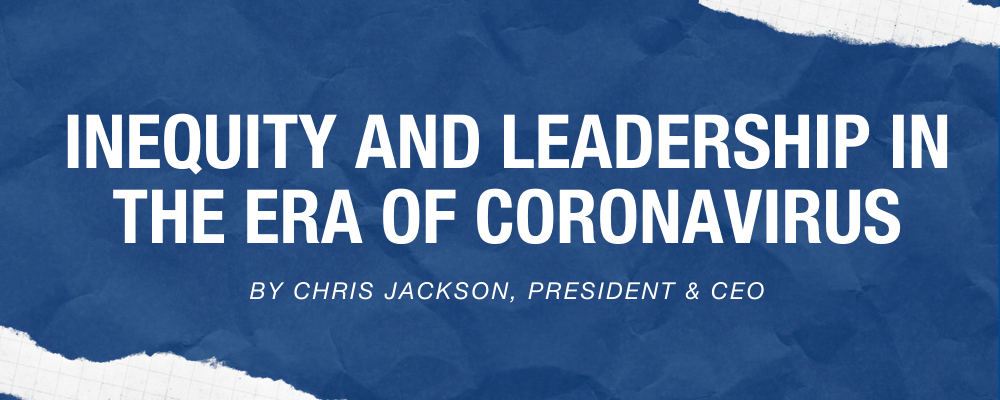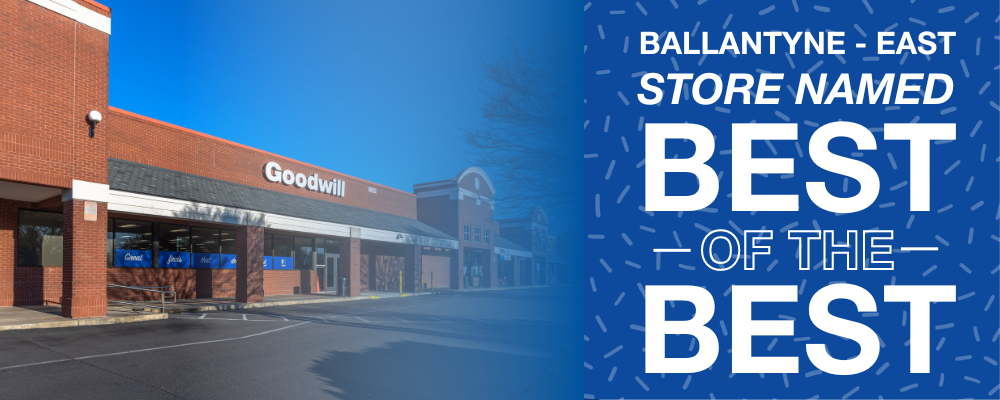By Chris Jackson, President & CEO of Goodwill Industries of the Southern Piedmont
As businesses across our region are experiencing extended closures due to the spread of COVID-19, many of our neighbors, friends, and family members are experiencing crippling financial impacts.
As the leader of an organization committed to helping people prosper, I like many other leaders am finding a steep new set of challenges as a result of this pandemic. And like many other leaders, I am committed to deliver on Goodwill’s promise to the community, regardless of circumstances.
Goodwill continues to focus heavily on supporting our team members, our clients, our customers, and our community. With significant constrictions on budgets, we like many, have had to make some tough decisions. We are also finding that the economic impact of the crisis is making deeper community challenges more visible.
On March 26, we closed all of our retail stores and other parts of our business based on the stay-at-home orders for our region. We made the extremely difficult decision to temporarily lay off more than 750 team members while also supporting those working virtually so we could continue to provide access to training and employment services for people in our community, as they need now them more than ever.
It is no secret that the Charlotte region struggles with upward mobility for all of its residents. COVID-19 has amplified this and is disproportionately impacting people with limited resources, options, and access. While the coronavirus doesn’t discriminate, data indicates that people of color and low-income families are bearing the brunt of this pandemic. In short, the impact is reflecting the racial and socioeconomic disparities that exist in our community.
Individuals in traditionally low-wage jobs are less likely to have health insurance and potentially lack paid time off. Layoffs are affecting workers in positions related to food and hospitality services, retail, and more. Unemployment claims have skyrocketed to an historic level. (As of April 17, the North Carolina Division of Employment Security reported receiving more than 630,000 claims for unemployment benefits, with most of them related to COVID-19.)
While these burdens may be unprecedented – they do not have to be insurmountable.
We must be creative and engage differently to support those whose lives have been upended and increasingly uncertain. We must continue to support those already struggling to make ends meet to sustain themselves and their families.
I find myself reflecting on two key questions, and offer them to you to consider:
- How can we continue to find creative solutions to create opportunity during this pandemic, and in its aftermath?
- How do we continue to make progress for those facing the most challenging situations?
I have concluded that first – we can focus on what we can control, starting with our own organizations. Our teams are depending on us to do everything we can to ensure a safe and healthy work environment and to support them in sustaining their families.
Work to ensure an environment that creates access and removes obstacles. Allow flexibility in your policies to help team members navigate challenges. Wherever possible allow for remote working. Provide as much support as possible and be cognizant of and address the challenges that some may have if they don’t have the resources they need. Ensure equitable access to technology. Be mindful that individuals working from home are juggling challenging and stressful circumstances with children and other caregiving responsibilities.
Communicate, communicate, and communicate. Share the guiding principles you are using to make decisions, share with clarity what you know for sure, and be honest about what you don’t know yet. Stay connected, and encourage, support, and model self-care.
Don’t lose sight of the future. While we focus on getting through this healthcare crisis, we also need to continue to focus on the long-term needs of equitable access to opportunities and economic mobility. Create forums to discuss what will be necessary as we get on the other side of the pandemic. Focus on key questions about how we will need to work differently to ensure the best outcomes for individuals and families, and how to do so in the most collaborative and innovative way possible.
Commit to continuing this creative and collaborative momentum! Now is the time when we can step up to provide leadership in uncertainty, and to pave the way for supporting our communities for the long-term – together. We can each demonstrate leadership by working together and taking care of one another, both now and when the stay-at-home orders are lifted. I’m excited to see so many organizations leading the charge to address issues like food insecurity and inequities in internet access. I applaud businesses that have been on the cutting edge of providing relief to people experiencing financial challenges. Our call is to ensure this care and consideration continues in the days, weeks, and years to come.
As many others are leading the charge to make sure the Charlotte region is the caring community so many people desperately need, we intend to be a guiding light in this season of uncertainty. Goodwill exists to help people see possibilities, seize opportunities, and prosper. Our commitment is to stand by and with the people who need us most during this critical time. Our work is partnering with people in our community to help them achieve their goals around family-sustaining employment – this means accessing jobs that provide better wages, benefits that support their families, and opportunities to develop to build a career.
This is indeed a challenging time for all of us. I pray that as a community we will work together to get through it and in doing so, will gain some empowering lessons that will make us better.








Join the Conversation